Coffee is a delicious way to get a boost of energy in the morning or to defeat an afternoon slump, but coffee can also be defined as a health elixir. It's been found to reduce prostate cancer risk, reduce heart failure risk, and even lower your risk of hearing loss. And drinking a dark roast may even help you lose weight.
But for certain people, coffee may actually have more negative side effects than positive ones. For example, you may notice that coffee sometimes makes you anxious or jittery, or perhaps you find yourself rushing to the bathroom after every cup you drink. Coffee may even be affecting your health in a way completely unknown to you.
To better understand whether or not coffee is a good choice, we asked nutritionists about the people that should skip drinking coffee for better health.
People with IBS
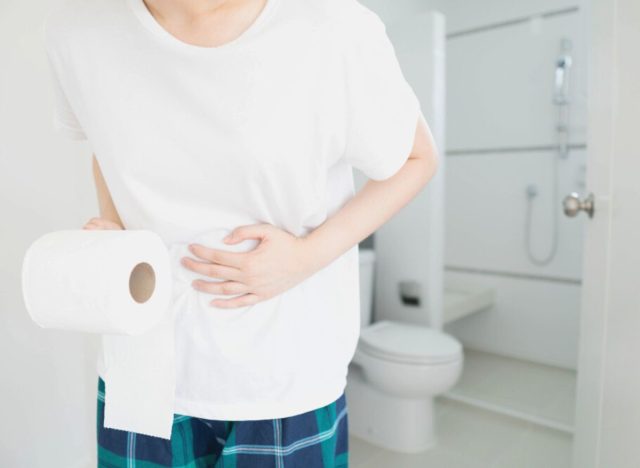
"Caffeine can increase bowel regularity, including increasing the chances of diarrhea, a major symptom of irritable bowel syndrome (or IBS)," says Angel Planells, MS, RDN, Seattle-based registered dietitian nutritionist, and former president of the Washington State Academy of Nutrition and Dietetics and Greater Seattle Dietetic Association. "So if you have IBS, it is encouraged to limit/avoid caffeinated beverages."
People with glaucoma
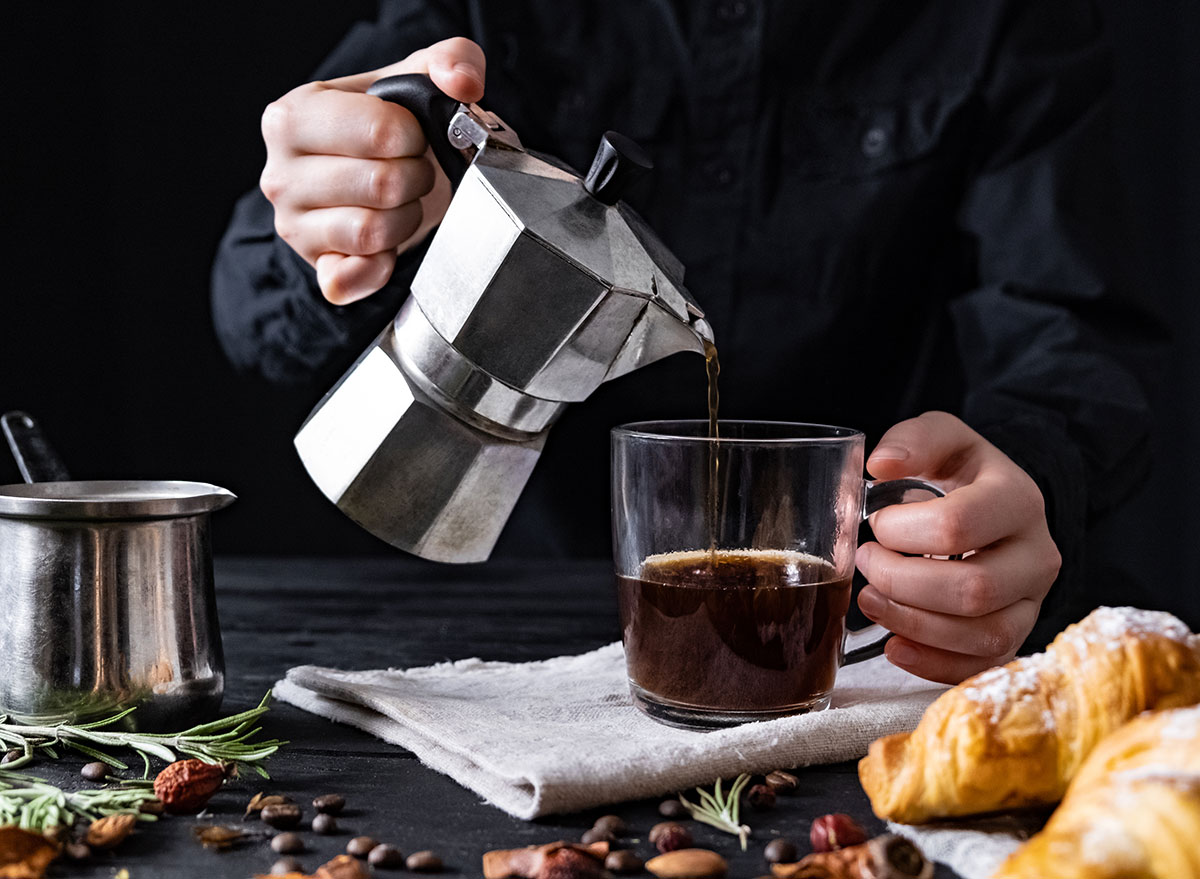
"Intraocular pressure increased for those with glaucoma when consuming coffee, so it's encouraged to limit [or] avoid intake, but more research is warranted," says Planells.
According to research by Mount Sinai, drinking larger amounts of caffeine increased the risk of glaucoma in those who already had a predisposition to increased eye pressure.
People with overactive bladder
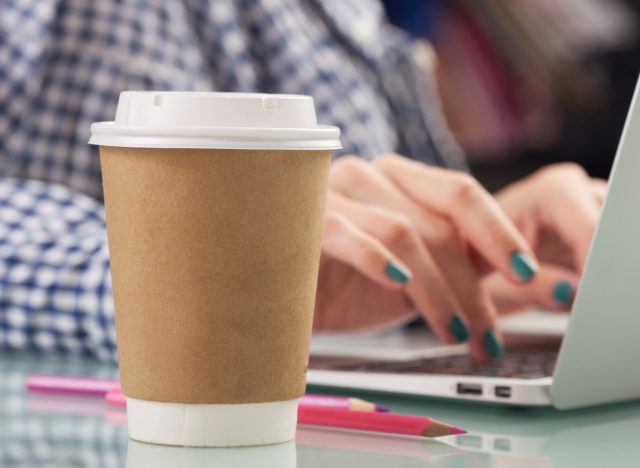
"We all know it is best to avoid a large cup of coffee before a long trip, especially if restroom breaks are limited. Caffeine intake can increase both urinary frequency and urgency," says Sue Heikkinen, MS, RD, registered dietitian for MyNetDiary. "If you don't regularly drink coffee, you may be even more sensitive to this effect."
People with heart conditions, like arrhythmias
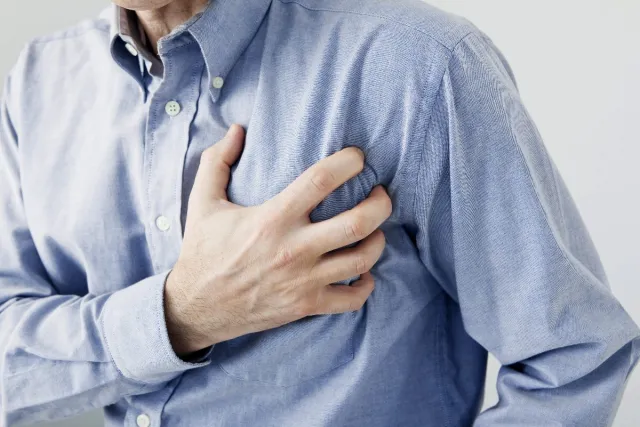
"As the caffeine from coffee can cause temporary increases in blood pressure and heart rate, it's important for anyone with pre-existing heart conditions to talk with their healthcare provider about if/how much coffee is safe to consume," says Kelli McGrane MS, RD, registered dietitian and Lose It! nutrition consultant.
Research published in the American Journal of Clinical Nutrition concluded that yes, there is the potential for short-term spikes in blood pressure levels when drinking caffeine. However, there isn't enough conclusive evidence on any longer-term effects on blood pressure or heart health.
People who are pregnant.
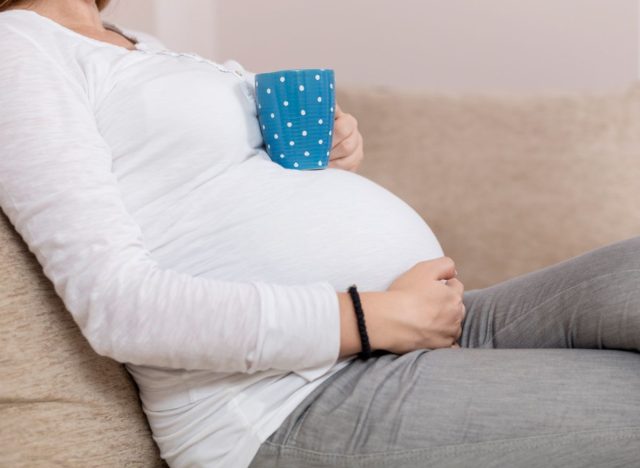
"The American College of Obstetrics and Gynecology recommends pregnant women limit caffeine to 200 milligrams (about what is found in two cups of coffee) daily in order to minimize the risk of miscarriage, premature labor, and low birth weight," says Heikkinen. "However, a 2020 review published in the British Journal of Medicine concluded there is no safe level of caffeine intake during pregnancy. Pregnant women should discuss their caffeine intake with their doctor."
People who are breastfeeding

"As caffeine is a stimulant and diuretic, the concern is that a breastfeeding mother may be at risk for dehydration," says Planells. "The American Pregnancy Association suggests avoiding caffeine as much as possible during pregnancy and breastfeeding."
People with sleep disorders
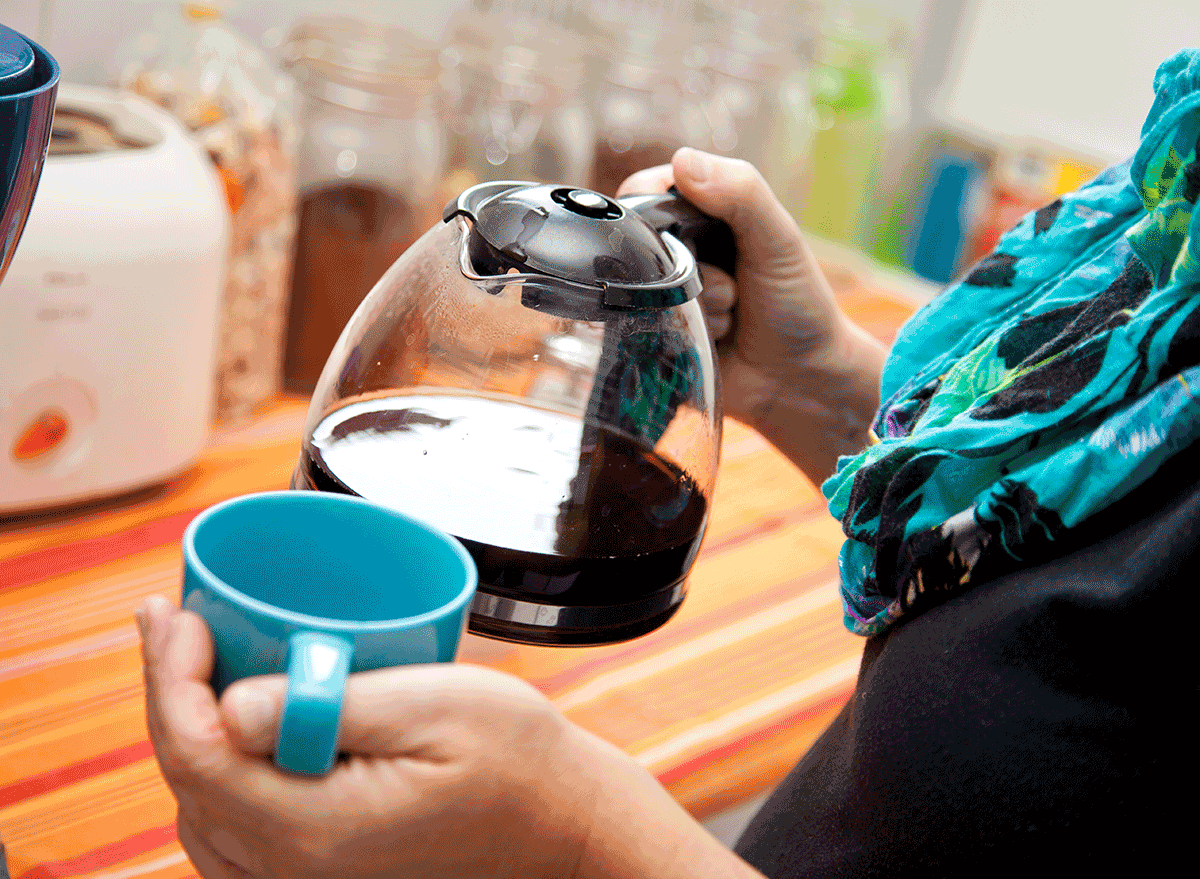
"It is understandable to reach for a cup of coffee (or more) after a poor night's sleep, yet your coffee habit may perpetuate a cycle of poor sleep and fatigue," says Heikkinen. "Even if you don't think your afternoon coffee affects your sleep, it could indeed affect sleep quality. Avoid caffeine at least six hours before bedtime, as recommended by the Sleep Foundation."
One study from the Journal of Clinical Sleep Medicine found that caffeine consumed even six hours before bedtime had the potential to disrupt sleep patterns. These findings are based on a level of 400 milligrams of caffeine, which is equal to around four cups of coffee, and even though you're probably not going to be drinking that much caffeine in the afternoon, it's important to note that caffeine clearly does have the power to affect your sleep.
People with high levels of anxiety or those prone to panic attacks
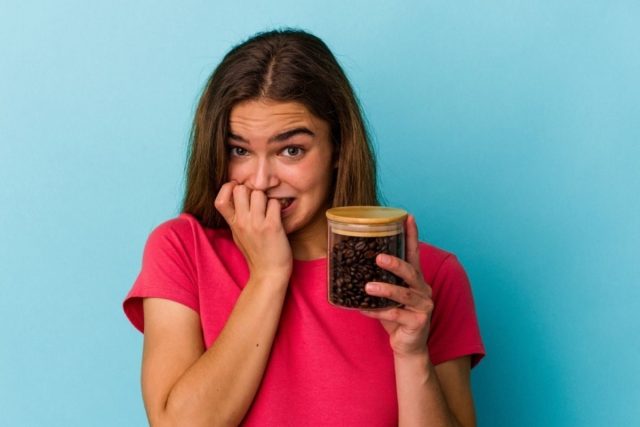
"Caffeine is a stimulant, which may worsen anxiety in some individuals," says McGrane. "If you regularly experience anxiety or panic attacks, you may want to consider avoiding or reducing your caffeinated coffee intake."
Research from General Hospital Psychiatry found that higher levels of caffeine (around 5 cups of coffee per day) could potentially bring on panic attacks in those with existing anxiety. Even if you're not consuming 5 cups, you can still watch your intake to ensure that you're not worsening any existing anxiety in your daily life.
People with diarrhea
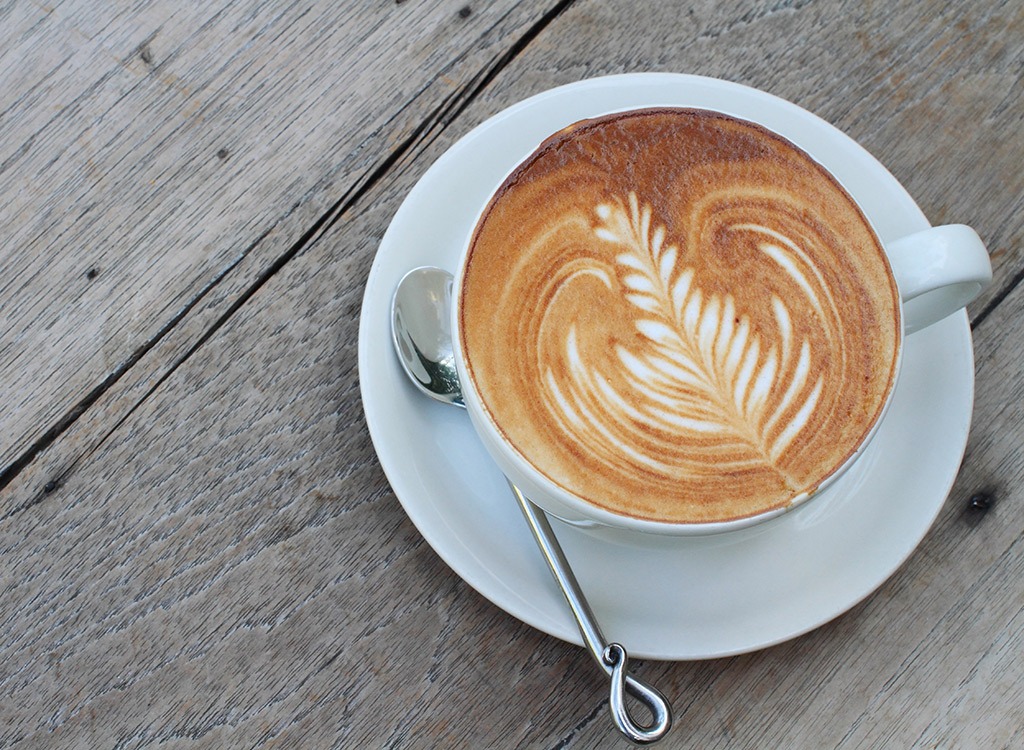
"Some people swear by their morning cup of coffee to 'get their bowels moving,' but this effect is not desirable if you are struggling with diarrhea," says Heikkinen. "Decaf coffee may be less problematic, although hot liquids, in general, tend to stimulate the bowels."
People with epilepsy
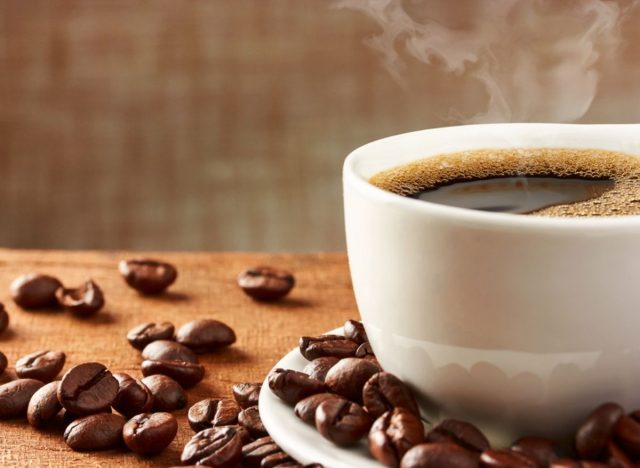
"While a limited study, [recent findings showed that] heavy coffee consumption was associated with increased seizure frequency. But more studies are needed," says Planells. Consider talking to your neurologist about your caffeine intake if you have epilepsy.
Kids under 12
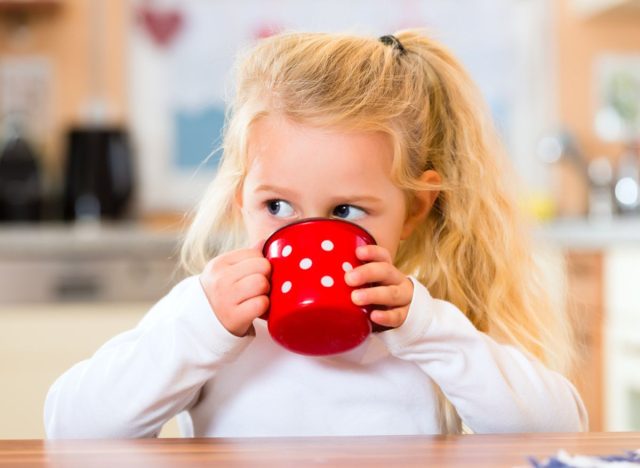
"While caffeine can make any of us a little jittery, it can have more noticeable and even serious side effects at smaller doses in kids," says McGrane. "For example, too much caffeine in kids can lead to increased heart rate, increased feelings of anxiety, difficulty concentrating, and an upset stomach. Another aspect to consider, especially in toddlers, is that coffee can mask hunger cues, so toddlers may not get the nutrition that they need for growth and development. Finally, keep in mind that coffee itself is quite acidic, and as a result can damage tooth enamel and increase the risk for cavities."
People with gastroesophageal reflux (GERD)

"Caffeine can loosen the lower esophageal sphincter, which is the valve between the esophagus and stomach. This could cause acid stomach contents to enter the esophagus, resulting in uncomfortable GERD symptoms," says Heikkinen. "If you have GERD, see if switching to decaf helps."
No comments:
Post a Comment